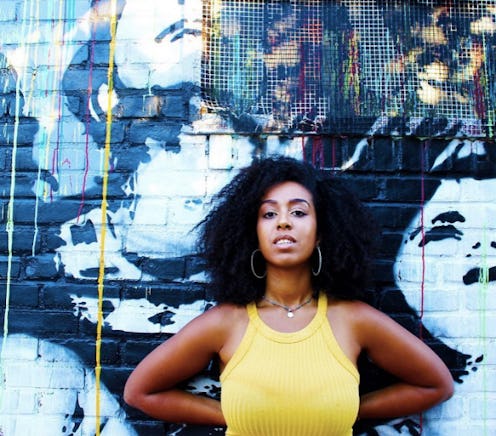Life
How To Respond To Subtly Racist Comments

Racism is no longer just the practice of excluding and oppressing groups of people through openly exclusionary laws. It's not just the social and economic discrimination of those with physical characteristics somehow deemed to be lesser. In 2016, we constantly find ourselves needing to know how to respond to subtly racist comments, because right now, racism now is more insidious than ever.
The impact of the microaggressions that brown, black, Asian, Latinx and other people of a wide variety of groups face day in and day out can be difficult to explain to those who haven't experienced them firsthand. How can I really let my white best friends know that constantly being asked to explain where I'm "actually from" can get more than a little draining? How do I describe how it feels to have a man on the bus plunge his hands into my hair and ask if it's real? How much can anyone who hasn't experienced these things understand that they all make you feel a little less than human, each and every time they happen?
Although its divisions may be arbitrary, we live our lives according to the rules mapped out by race: How we interact with others, where we live, the assumptions we make about people. And even when overt racism is no longer an objective act of oppression, many of us know that responding to comments which bely discriminatory undertones is still a daily part of life. Here are my suggestions for dealing with four types of subtly racist comments:
When Someone Challenges Your Ethnicity, Even Though You've Told Them All You Want To
Identity for ethnic minorities can be a nuanced and complex concept which is often dictated by societal stereotypes; as a result, it's often in constant flux for many of us. Speaking from personal experience, whenever I'm asked to explain my appearance — something which happens constantly — I divulge as much as I want depending on my mood at the time because I don't know the answer to that.
It's a highly personal subject, and whether or not it's question you're OK with being asked and answering of course depends on the individual; personally, I don't typically find it offensive — but that's largely dependent on the tone in which it's asked and the phrasing used. Some people simply won't take, "I don't know my full heritage" as an acceptable answer, which is when it turns into an issue for me. Not knowing all my ethnic make-up has caused me a lot of heartache and pain in my life, and the pushy follow-up questions can sometimes contain subtly racist undertones — whether the asker means to or not.
Re-affirming my truth with "That's all I know" doesn't always work because it's often followed with an incredulous facial expression and a demand for more information. Usually I have to go firm: "I'm not going to talk about it anymore" usually shuts that line of questioning down. Or a simple, "Oh it's too personal, so let's leave it." This sometimes kills the conversation flat, but if the other person doesn't realize that your privacy and comfort in discussing your personal identity trumps their curiosity, then do you really want to talk to them, anyway? I know I don't.
When Someone Hands You A Backhanded, Racist Compliment
"You're really pretty for a dark girl," or, "I don't usually like Asians, but you're cool," or, "You don't act like all the other Indians I know" are all examples of the many incredibly frustrating "compliments" that are actually racist comments that I and many others have heard many times throughout our lives. Usually, to point out how their limited view of certain racial groups is ignorant and offensive, you'll be criticized for not accepting the compliment. My advice? These people are usually beyond hope; cut your losses — and the conversation. "That wasn't cool; I'm going to go now" should do it.
When Someone Makes A Racist Joke
Don't laugh. Like, ever.
When Someone Stereotypes People Like You, But Says They Don't Mean You, Specifically
"Oh, I don't mean you, but you know, some people like you," they'll say, after blurting out something wildly offensive about those who share similar physical attributes with you.This is perhaps the most awkward type of subtly racist comment to respond to, because it's as if the person catches themselves making unacceptable generalizations before realizing someone who will definitely be offended is in their presence, and tries frantically to backpedal. Meanwhile, there you are, feeling confused, isolated, and angry. And if it's in a group situation, you can amplify these feelings by 100.
When this has happened to me, I found that a slow explanation of why the aforementioned comment is offensive by directly relating it back to you sometimes helps to widen narrow minds. Something like: "Would you mind explaining exactly how I am exempt from the group of people you're stereotyping?" may force the person making racist comments to stop and consider the human impact of what they're saying when you're right in front of them.
But of course, having a few strategies to respond to subtly racist comments in your back pocket is just a stopgap measure. That's not what will really solve the problem; the actual solution is about us collectively becoming aware enough that the presence of racist comments and microaggressions are the exception, rather than the rule. It's not the responsibility of the people on the receiving end of these comments to educate everyone else about the issue, but many are willing to share their stories through things like the GetWoke campaign, the Beyond the Wall installation, and more. So read. Listen. Learn. This is how we become the change we want to see in the world.
Images: Georgina Lawton/Bustle; Giphy (4)